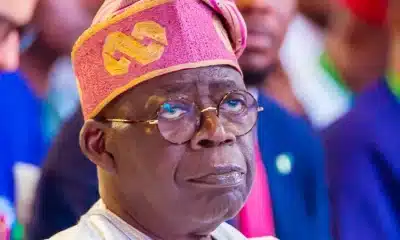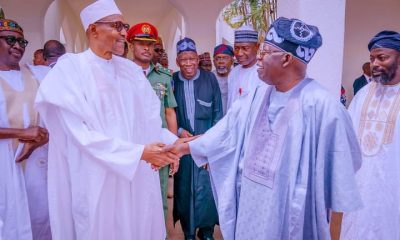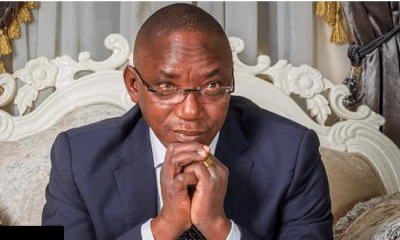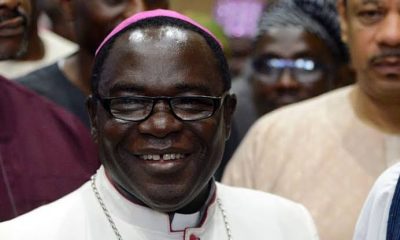Nigeria News
Read Bishop Kukah ‘Controversial’ Statement To US Congress [Full Text]
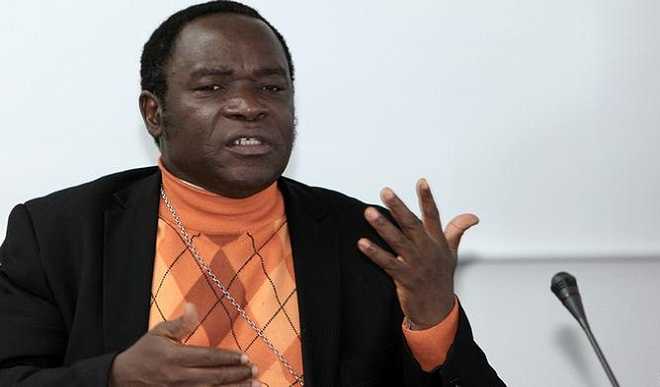
The Bishop of the Catholic Diocese of Sokoto, Matthew Kukah, recently attracted controversy following his appearance before the US Congress.
Kukah had told the US Congress Foreign Affairs Committee that the Muhammadu Buhari administration is doing nothing to quell attacks on Christians which is on the increase.
According to the Catholic, extremists, bandits, Fulani herdsmen and Boko Haram were targeting many schools in the North especially, Christian ones and are “indoctrinating the children. They end up converting these children to wives, cooks, spies, sexual slaves and so on.”
But reacting on behalf of Buhari, the president’s Media and Publicity Assistant, Garba Shehu accused Kukah of carrying out the work of opposition political parties.
While insisting that there is no bias against Christians in the present administration, the presidency stated that appointments are not given based on tribe or religion.
Garba Shehu also pointed out that most of those affected by bandits, Fulani herdsmen and Boko Haram are mostly northern Muslims.
Below is the statement in full:
STATEMENT TO THE HOUSE FOREIGN AFFAIRS COMMITTEE ON THE NIGERIAN SITUATION ON THE RELIGIOUS FREEDOM HEARINGS IN WASHINGTON DC, JULY 13TH, 20212
By Bishop Matthew Hassan KUKAH, Catholic Diocese of Sokoto.
1: From its inception as an independent nation, Nigeria has remained a volatile country. Home to almost two hundred million people communicating in over five hundred tongues, Nigeria remains one of the most enigmatic pieces of God’s real estate on earth.
Running, stumbling but never fatally falling except for a brief civil war, she is home to one out of five black people on earth. Highly resourced, but endemically corrupt, a combination of serious governance missteps, series of military coups, years of maladministration, a culture of violence have seriously slowed down what should have been one of the greatest nations on earth. It has left its people vulnerable to poverty, disease, violence and death.
2: Today, for the purpose of my testimony, the focus is on the Christian faith and even within Christianity, I speak for the Catholic Church in Nigeria. I believe there will be many voices and perspectives on the issues, but very little disagreement on the debris of human suffering and pain inflicted on the citizens of our country through the abuse of God’s name. We are all too familiar with the stories of the tragedies across the world by misguided and evil men and women who are determined to destroy the foundations of our common existence using religion. I will briefly sketch the experiences of the Christian community in the Nigeria with this tragic culture of death.
3: This audience already has deep knowledge of the key issues, the politics, the drivers and the financiers of terrorism on a global scale. Nigeria’s experience derives from the experience of the larger global community.
Persecution of Christians in Nigeria has occurred at different levels with almost the same pattern, sometime subtle, often out rightly violent and destructive. A few examples. There have been dastardly actions directed at Christians because of their faith. We have cases of Pastoral agents such as Priests and Nuns who have been kidnapped, released after the payment of ransom or brutally murdered.
Churches, medical facilities, presbyteries have been razed to the ground with no provocations from the communities. I will cite only three examples even though there are many more cases across denominations.
4: In 2018, two Priests, Frs. Joseph Gor and Felix Tyolaha were murdered along with 17 of their Parishioners while celebrating Mass at their local Church when gunmen stormed the Church in the Diocese of Makurdi, Benue State. In January 2018, four Seminarians were kidnapped inside the Good Shepherd Major Seminary Kaduna.
After prolonged negotiations and the payment of ransom, three of them were released while one, Michael Nnadi from the Diocese of Sokoto was brutally murdered.
5: In March 2020, a detachment of Policemen came into the Seminary to report that they had captured Michael’s murderers. They confessed their crime and also gave insight into why they killed Michael. They said that in the course of their captivity, Michael kept preaching and asking them to repent of their evil acts and turn towards God. We were, said one of his captors, angered by the fact that he was persistent in his appeal to us to repent despite knowing that we were Muslims! Along with Michael in the same camp had been one Mrs. Bolanle Ataga, a married woman and mother of two daughters who had been captured also with her children. After payment of ransom, only her two daughters were released. Two weeks later, her husband concluded negotiations for her return.
However, on the day of her release, one of her captors said that the only condition for her release would be for her to sleep with the leader of the murderous gang. According to her Fulani captor, she told their leader that he could only sleep with her dead body! He immediately ordered her murder.
6: In October 2019, two Pastors with the Church of Christ in Nigeria, COCIN, Rev. Joseph Duna Dacighir and Godfrey Ali Shikagham were murdered by their captors for their Christian faith. In January 2020, the Chairman of the Christian Association of Nigeria, CAN, Michika Local Government of Adamawa State was murdered by ISIS.
The list is very long but these incidents are indicative of the faith of hundreds of believers.
7: Beyond the physical elimination of Chrsitian missionary Pastoral agents, other strategies adopted in the persecution of Christians are, the total or partial destruction of Church related infrastructure such as Churches, Schools, Convents, Health facilities, and Presbyteries across the country. In some Dioceses in the North East such as Maiduguri and Yola, priests have had to leave their Parishes after they had been destroyed and the community sacked. The scenario has moved to the north Central and North West zones.
8: There are also cases of abduction of Christian girls, turning them into sex slaves, forcing them into marriages and forced conversions to Islam. In some cases, these girls and boys have been forced to become spies, cooks, messengers, foot soldiers for their captors. The scope of persecution is wide and cross cutting including men and women. Again, as I have said earlier, these stories are known to most of the audience. Perhaps what is most important is for me to speak to what kind of short, medium and long term solutions should we be contemplating. No one has the answers, but we must continue to prepare for a life after this tragedy.
9: For us at the Catholic Bishops Conference, we have remained relentless and consistent in speaking prophetic truth to power. We have done this through many Communiques and Statements calling attention of government to the tragedies afflicting our people and the nation’s slide to chaos. We have called on the President to resign if he could not guarantee the safety of lives of our people. Second, notwithstanding these attacks on our people and facilities, we continue to support our fellow citizens with food and clothing in the best traditions of our faith using such time tested institutions of the Church as; Justice Peace and Development Commissions, JDPC, and Caritas. Both work closely and have offices across all the 56 Dioceses of Nigeria. We also offer pastoral support
for our people in the camps of the Internally Displaced Persons, IDP through skills and financial support.
10: We continue to engage the federal and state governments, seeking collaboration on all fronts. Education is on the concurrent list of items on our Constitution and this means that each state acts independently. In cases where we have Christian minorities, Christian children in public schools have no access to the teachings of the faiths. We have just discovered that even within the Deradicalisation and Rehabilitation Programme for so called repentant terrorists, the teaching of Christian Religious Knowledge is not included. Each child should be entitled to access teachings in their faiths, but this is not often so.
11: Amidst the pandemic, the Catholic Bishops offered the federal government a total of 456 Health facilities across the country in case the Covid-19 pandemic proved overwhelming and overstretches the lean resources of both federal and state governments. Frustrated by the endless bloodletting, the Catholic Bishops in March, 2020 took to the streets to call the attention of the federal government to end the killings across the country. Our actions have been motivated by the best traditions of our faith in times of crises and not politics.
12: By way of conclusion, let me make a few appeals. First, to the international community. The persecution of Christians based solely on their faith and not on any crimes they have committed poses one of the greatest threats to our existence and common humanity. Christians make up over one third of the world’s population and have laid the foundation for human civilisation. It is in the interest of our collective survival that we must rise in defense of the freedom of Christians everywhere in the world to live and practice their faiths. Where it occurs, I believe Muslims of believers of other faiths will air their concerns.
13: We commend those who continue to work in the area of protecting religious freedom even in the face of personal danger and risk to their own lives across the world. This is a battle that we must win because without faith, we will return to the Hobbsean state of nature with its nastiness, brutishness and death. Thus, the organisers of this Testimony deserve our commendation for putting this issue under the spot light. We appreciate the great work of organisations like Aid to the Church in Need whose work has helped to rebuild our Churches and supported the formation of new pastoral agents. The Hungarian government’s assistance to communities in conflict through the Hungary Helps programme is helping us build new classrooms and health
facilities.
14: International Aid Organisations must reset the donor templates of their engagement with countries that are in conflict. There needs to be a change in how these Agencies see Religious groups and communities in crisis. It is important that a threshold of expertise, competence and proficiency be set for accessing Aid. The faith communities are closest to the people and, in our case, everyone knows what the Catholic Church has done over time. The most critical needs of our people now are Education of orphans, support for widows and victims of violence. This requires huge financing but often, the needs of our people are modest. My appeal therefore is that Aid Agencies consider more practical ways of engaging Church structures to alleviate the sufferings of the victims of persecution by way of granting scholarships to vulnerable children. Only sound education, taking millions of children from the streets can guarantee victory over these agents of darkness.
15: It is important to restate that even though the purveyors of terrorism, banditry, kidnapping and murders of our people continue to appeal to Islam as their source of inspiration, what we are dealing with is the Jihadist/Salafist supremacist strain of the faith that is at best a cancer that threatens the Muslims who do not believe what they themselves believe. We must name the devil so as to cast it out. This means that first, a majority of those who are good Muslims must rise in defense of their religion by reversing this inhuman view of religion which pretends to be working in the name of the religion. Muslims in northern states have suffered disproportionately in our conflicts in Nigeria. Sadly, this is occurring after the President has continued to privilege Muslims in appointments in the country.
16: In Nigeria, the Muslim elite have been at their hypocritical best, using religion as a tool for political mobilisation. No one expected that the Buhari administration will end up exploiting the support he received from across the country only to turn around and run such a nepotistic administration. The challenge of rebuilding our country, moving it away from the brink requires collective efforts on our part. However, the policy choices of this government have reversed the gains we made in the area of peaceful co-existence and dialogue. We cannot give up. We must renew our commitment to creating a just society.
I end with an appeal in the words of our holy father, Pope Francis who, in his recent encyclical said: “Let us dream, then, as a single human family, as fellow travelers sharing the same flesh, as children of the same earth which is our common home, each of us bringing the richness of his or her beliefs and convictions, each of us with his or her own voice, brothers and sisters all.”



